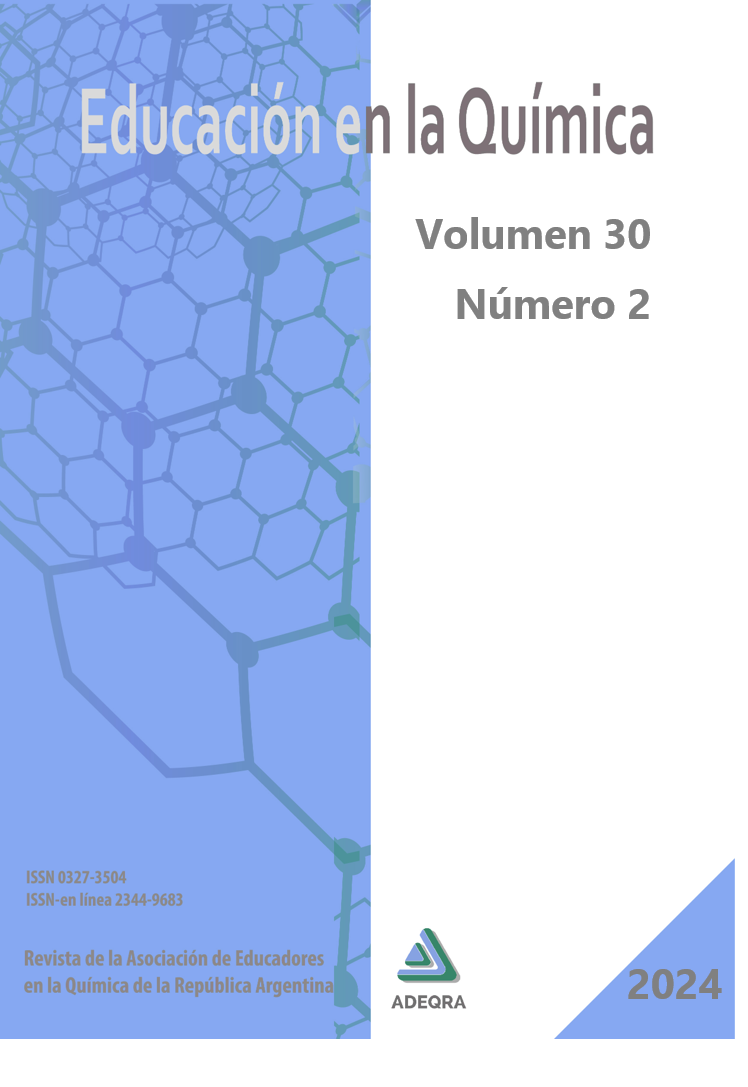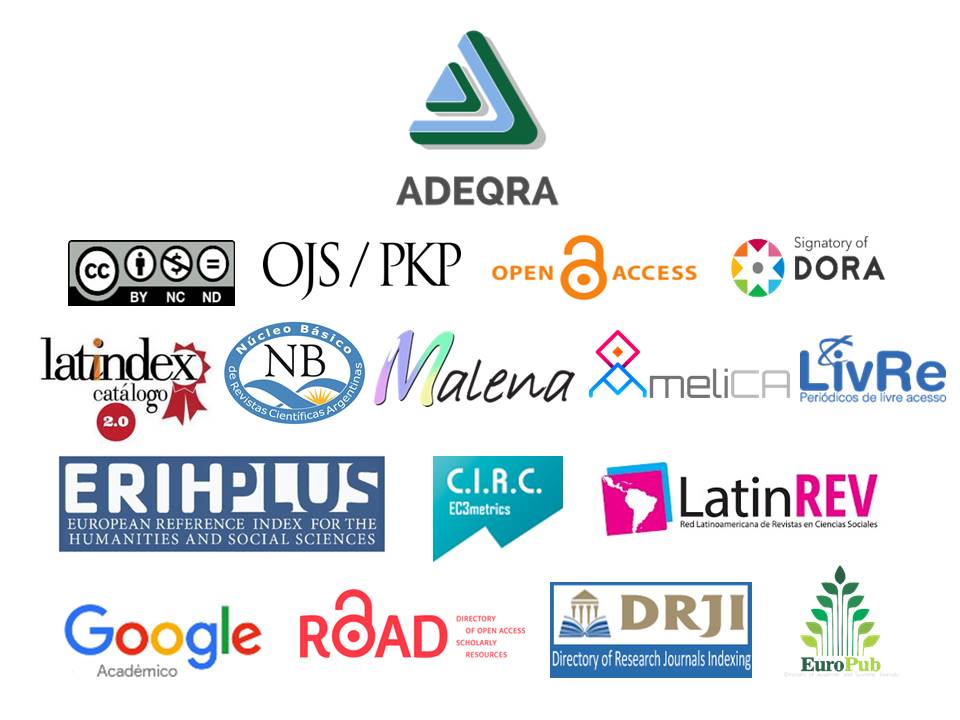Conceptions about teaching combustion in a chemistry teacher education student
Keywords:
conceptions, teaching, interconected modelAbstract
This study analyzes the conceptions about teaching of a Chemistry Teacher Education student from the Faculty of Exact and Natural Sciences of the National University of Mar del Plata, focusing on the topic of "Combustion". The pathways of change in the student's productions were identified through a Professional Development Model, from which his conceptions about teaching were characterized. The results show that most of the pathways of change are related to the dimension of "How to teach", while the dimensions of "What to teach" and "Why to teach" have a lower presence. A tendency towards contemporary approaches to teaching was observed in his conceptions about teaching, with a focus on student-centered and active learning. Although conducted with a single case, the study provides valuable information about professional development in initial teacher Education.
References
Candela, B. F. (2012). La Captura, la documentación y la representación del CPC de un profesor experimentado y “ejemplar” acerca del núcleo conceptual de la discontinuidad de la materia. Universidad del Valle, Instituto de Educación y Pedagogía.
Castañeda Mosquera, L. A. y Perafán Echeverri, G. A. (2015). El conocimiento profesional del profesor: Tendencias investigativas y campo de acción en la formación de profesores. Pensamiento palabra y obra, 1(14), 8–21. https://doi.org/10.17227/2011804x.14ppo8.21
Clarke, D., y Hollingsworth, H. (2002). Elaborating a model of teacher professional growth. Teaching and Teacher Education, 18(8), 947–967. https://doi.org/10.1016/s0742-051x(02)00053-7
Coll, C. (2021). Enseñar y aprender en el siglo XXI: el sentido de los aprendizajes escolares. En Á. Marchesi, J. C. Tedesco y C. Coll (Eds.), Calidad, equidad y reformas en la enseñanza (pp. 101–112). OEI-Santillana.
Funes, L. A., Echeverría, F. y Nuñez, D. G. (2021). Análisis de concepciones de enseñanza de la astronomía de futuros profesores mediante el análisis de procesos reflexivos. Revista de Enseñanza de la Física, 33, 281–288. https://revistas.unc.edu.ar/index.php/revistaEF/article/view/35575
Funes, L. y García Nuñez, D. (2022, noviembre 29). Análisis de las concepciones sobre la enseñanza de la Astronomía en estudiantes del Profesorado en Física [Presentación de póster]. V Jornada Investigar «Diálogos y Desafíos», Mar del Plata, Argentina.
García, M. B., Martín, S. S., Sanz, M. y Vilanova, S. (2020). Ciencia, enseñanza y aprendizaje: Concepciones de los profesores universitarios. Eudem.
Hernández Pina, F. y Maquilón-Sánchez, J. J. (2010). Las concepciones de la enseñanza. Aportaciones para la formación del profesorado. Revista Electrónica Interuniversitaria de Formación del Profesorado, 13(3), 17–25.
Kember, D. (1997). A reconceptualisation of the research into university academics’ conceptions of teaching. Learning and Instruction, 7(3), 255–275. https://doi.org/10.1016/s0959-4752(96)00028-x
Kember, D. y Leung, D. Y. P. (2006). Characterising a teaching and learning environment conducive to making demands on students while not making their workload excessive. Studies in Higher Education, 31(2), 185–198. https://doi.org/10.1080/03075070600572074
Pecharromán Tristán, I. (2003). Teorías epistemológicas implícitas en diferentes dominios: Influencia de variables relacionadas con la instrucción. Universidad Autónoma de Madrid.
Pozo, J. I. y Scheuer, N. (2006). Nuevas Formas de Pensar La Ensenanza y El Aprendizaje. Grao.
Prosser, M., Martin, E., Trigwell, K., Ramsden, P. y Lueckenhausen, G. (2005). Academics? experiences of understanding of their subject matter and the relationship of this to their experiences of teaching and learning. Instructional Science, 33(2), 137–157. https://doi.org/10.1007/s11251-004-7687-x
Pujol-Cols, T., García, M. B. y Cutrera, G. (2022). El uso del modelo interconectado como herramienta para analizar e interpretar el diario de clases de un futuro profesor en química. IV Jornadas sobre las Prácticas Docentes en la Universidad Pública (La Plata, 26 al 30 de septiembre de 2022).
Ravanal Moreno, E., Camacho González, J., Escobar Celis, L. y Jara Colicoy, N. (2014). ¿Qué dicen los profesores universitarios de ciencias sobre el contenido, metodología y evaluación? Análisis desde la acción educativa. Red U, 12(1), 307. https://doi.org/10.4995/redu.2014.6420
Schiepe-Tiska, A., Roczen, N., Müller, K., Prenzel, M. y Osborne, J. (2016). Science-related outcomes: Attitudes, motivation, value beliefs, strategies. En Methodology of Educational Measurement and Assessment (pp. 301–329). Springer International Publishing.
Tardif, M. (2004). Los saberes del docente y su desarrollo profesional. Narcea Editorial.
Trigwell, K. y Prosser, M. (2004). Development and use of the approaches to teaching inventory. Educational Psychology Review, 16(4), 409–424. https://doi.org/10.1007/s10648-004-0007-9
van Woerkom, M. (2003). Critical reflection at work: bridging individual and organizational learning. University of Twente.
Vilanova, S., Mateos-Sanz, M. M. y García, M. B. (2011). Las creencias sobre la enseñanza y el aprendizaje en docentes universitarios de ciencias. Revista Iberoamericana de Educación Superior, 2(3), 53–75.
Wongsopawiro, D. S., Zwart, R. C., & van Driel, J. H. (2017). Identifying pathways of teachers’ PCK development. Teachers and Teaching, 23(2), 191–210. https://doi.org/10.1080/13540602.2016.1204286
Zabala, V. A. (2008). La práctica educativa: Cómo enseñar. Grao.
Published
How to Cite
Issue
Section
License
Copyright (c) 2024 Leonardo Andrés Funes

This work is licensed under a Creative Commons Attribution-NonCommercial-NoDerivatives 4.0 International License.



